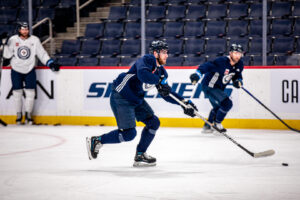 While athletes’ mental health and psychological performance in sports is becoming more recognized today, it is still underappreciated. There are many different techniques that aim to aid an athlete’s performance, but the thread that connects them all is confidence. From a psychological standpoint, confidence is an athlete’s thoughts, which form their beliefs, influence their behaviours, set their expectations, and create their perception. That perception becomes their reality.
While athletes’ mental health and psychological performance in sports is becoming more recognized today, it is still underappreciated. There are many different techniques that aim to aid an athlete’s performance, but the thread that connects them all is confidence. From a psychological standpoint, confidence is an athlete’s thoughts, which form their beliefs, influence their behaviours, set their expectations, and create their perception. That perception becomes their reality.
Confidence also has a huge influence on perhaps one the most sought-after athletic attributes – speed. In a game situation, speed is a mix of both physical and mental ability. An athlete can have all the physical tools to produce speed, but if they are not confident in what their job is, where they are supposed to be, how the play is going to develop, or what they are capable of, they will play apprehensive and slow.
With the knowledge of what confidence is and why it’s important, the big question is: how do you get it? Since confidence is a psychological attribute, the answer may surprise some – you actually want to shut off your brain. Overthinking a scenario or second guessing yourself reduces your confidence and slows your reaction. A large part of being able to shut your brain off and perform has to do with your level of preparation. This is where practice comes in. Practice doesn’t make perfect, but it does help build confidence. When you physically perform a task, you create neural pathways. The more you do it, the deeper the pathways become and the more it becomes ingrained. When you carry this over to a game situation, you can perform tasks without overthinking and they become automatic, and because they feel automatic, your confidence will be high. There is a belief and expectation that we can do it, and this positively affects our behaviour, making perception a reality.
To make sure your confidence is high, put a full effort into practice. Perform drills with intensity, watch film, ask questions, and know your situational responsibilities. If you feel your confidence is low during a game, shut your brain off and focus on the simplest of tasks. These tasks will be things that require no talent: skating hard, forechecking, backchecking, and being in the correct position, which you should know from film and meetings. Do not try to do too much; keep it simple and watch your confidence begin to grow as you lean into the aspects of your game that you have practiced the most.
It is often the simplest things that make the biggest difference. That’s not to say they are easy. Putting a full effort into practice isn’t always easy, but it is simple. Watching film and paying attention in meetings isn’t always easy either, but it is simple. These all require effort, and the good news is that effort is one of the few things that is one hundred percent under your control at all times.
Confidence is key to your performance. Build it and maintain it by doing the little things right.
Until next time,
Strength, Courage, Hustle, Commitment
AJ Zeglen
This article was originally published in Game On – Manitoba’s hockey community magazine.






